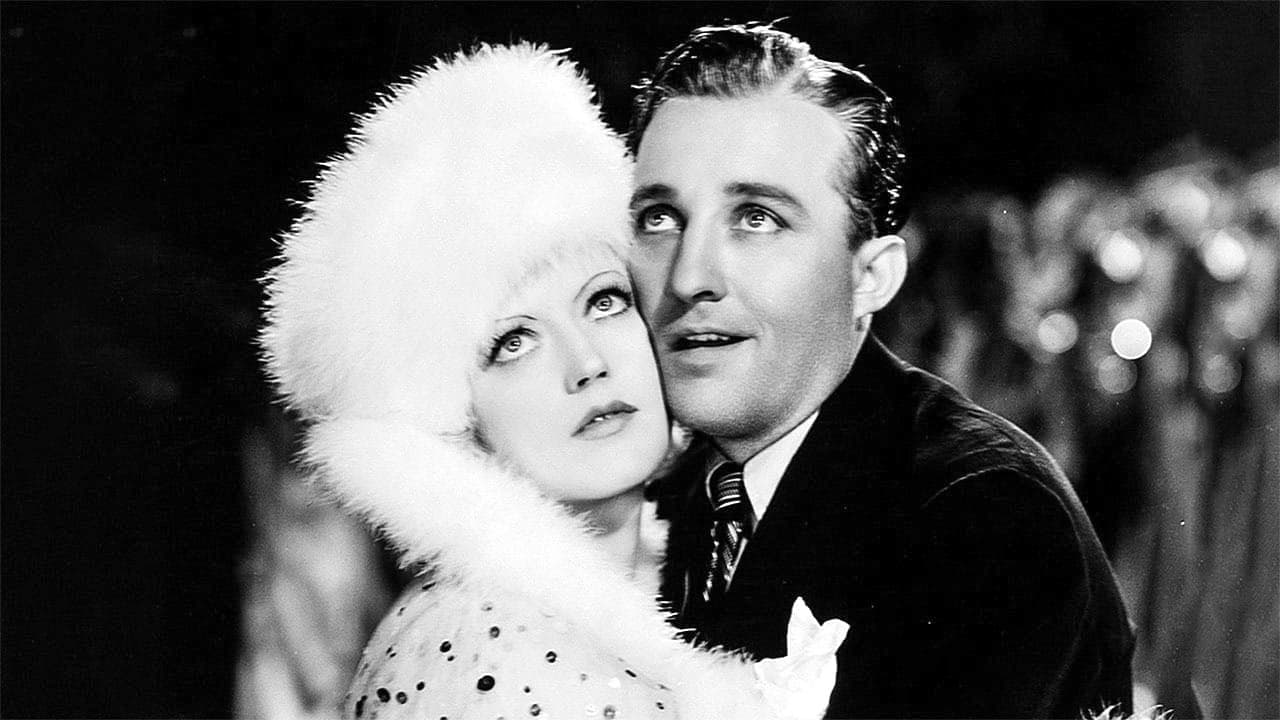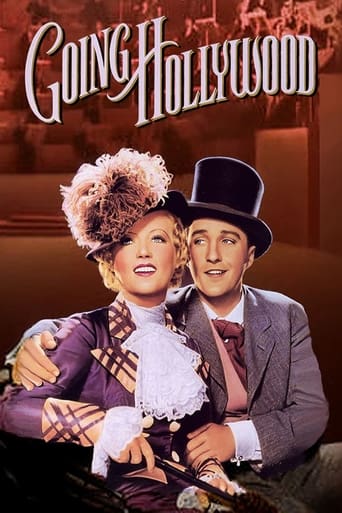

The next time you're in Grand Central Terminal in Manhattan, take a good look at the art deco train station, then give this movie another (or first) viewing. You too, will get a sense of nostalgia as Bing Crosby breaks into the title song. Toss in former girl's school teacher Marion Davies as the star-struck young lady who reluctantly ends up becoming an actress, temperamental Fifi D'Orsday (in her biggest film role), funny Patsy Kelly, money man Stuart Erwin, and sour-pussed Ned Sparks, and you have a dyslexic "42nd Street" where the extra gets to be a film star rather than the chorus girl getting to be a Broadway star. The film becomes a bit dramatic, almost a variation of "A Star is Born" as Crosby descends into possible alcoholism after a misunderstanding with Davies (concerning French spitfire D'Orsday), so the second half is a major "mood swing". However, there is a very amusing opening sequence with moonstruck young Davies absent from a teacher's meeting (definately half the age of the others) which includes Clara Blandick as the confidante who is far more easy going than the elderly teacher who proclaims, "I'm ancient Greek history" and the masculine gym instructor who answers her attendance call with a very macho "Here I am." Miss Briarcroft, the principal, who gets absolutely no billing even in the unbilled credits, appears slightly younger, but her hatred towards the radio and music and romance in general is certainly the push that Davies needed to get out of a life she hated and into the glorious gowns and furs at MGM. This scene was basically repeated by Suzanne Pleshette in the 1960's soaper "Rome Adventure" where she went "Viva Italiano" rather than to tinseltown. Some of MGM's brightest stars of the time appear in newsreel footage after a sequence which breaks the record as the fastest train ride ever from New York to Hollywood....3 minutes! Sam McDaniel (Hattie's brother) is the Grand Central porter who dryly sings "Where ya all going'?".This enjoyably lavish spectacle also includes Crosby's seductive "Temptation" (which seems to me to be one difficult song to try and sing---it needs much acting with it as well, so that says something about der-Bingle...) and a fun dream sequence ("We'll Make Hay When the Sunshines"). Davies has a radiant smile, dances nicely in her big number, and "has never looked lovelier", as Louella Parsons would always report. But in this case, it was true, her cross-eyed gaze appropriately handled by MGM's photographic team (to William Randolph Hearst's pleasure, I'm sure.). While the title song's opening lyrics, "Out Where They Say, Let Us Be Gay!" may mean something else now, the result is Hollywood's anthem to New Yorkers who wanted to break into movies, not Californians who wanted to hit Broadway.
... View MoreMarion Davies is a young woman who quits her job as a teacher and is content to chase a singer (Bing Crosby) in "Going Hollywood," a 1934 film also starring Stuart Erwin, Fifi D'Orsay, Patsy Kelly and Ned Sparks. Davies fancies herself in love with a crooner and follows him to LA, where he's about to make a picture with a temperamental French actress (D'Orsay) who is also his current girlfriend.Before becoming the singer of "White Christmas," Bing Crosby was an innovative performer, the first so-called "legit" singer to cross over into popular song. At one point in his career, Crosby actually was offered the title role in Verdi's "Rigoletto." Hearing him in the '20s and '30s, it's easy to understand why. Though Crosby's voice was always fluid and beautiful, he was less easygoing and took many more vocal risks back in the day, as evidenced in this film. The robustness with which he sang, and his beautiful high notes are sensational. The most striking number he does is "Temptation" with the camera focusing from time to time on a close-up of D'Orsay's face. The film is nearly all music, but nothing as good as "Temptation": "Our Big Love Scene," "Beautiful Girl," "Just an Echo in the Valley," etc.There is a wonderful scene done by the Radio Rogues, who play techs in the film where they improvise a radio program that references stars of the era such as Morton Downey, Russ Columbo, Rudy Vallee and Kate Smith.Marion Davies at this point was 36 - way, way, over the hill for a lead actress in those days - and she requested both Crosby and D'Orsay to be in the film. Hearst didn't want either one and had Lili Damita in mind for the D'Orsay role. He relented when others told him Crosby would be good for Davies' career. Though Davies will eternally get a bad rap because of the untalented Susan in "Citizen Kane," she was in fact a lovely actress and a very good comedienne. She couldn't sing and her dancing was from the Ruby Keeler Hoofer School - but I actually found her lighter on her feet than Keeler. That obviously was a style of tap back in those days that thankfully is gone.This is a very entertaining film, and if you want to hear Crosby at his finest, this is one of the films that is a must. He is remembered as a wonderful singer and successful actor today, but in actuality, his contribution to music was much greater than is realized now.
... View MoreMARION DAVIES may not have been the inspiration for the lady in Citizen Kane's life, but she sure comes close to making us believe Orson Welles based his story on the Hearst/Davies relationship.As seen here, Miss Davies looks like Joan Crawford with bleached blonde hair and a fixed stare in her starry eyes. She has a big, hearty smile but when it comes to singing, dancing and acting, her talents are scarcely there. She is clunky, to say the least, in her dancing moments and has a voice as smooth as sandpaper when she tries to sing with Bing. As for her acting--well, let me put it this way, three strikes and you're out.As for BING CROSBY, he does very well in this early film, sounding every bit like the classy crooner he was in those days. His talent is evident throughout, overcoming the pedestrian script with his own brand of casual charm. Too bad he had no one with corresponding skills to play opposite. He sounds especially mellow with his rendition of "Temptation" and a couple of other tunes are pleasantly rendered.But let's face it, this is one dated, clunky musical that falls flat in the attempts at laughter even though Patsy Kelly is present to deliver her own brand of humor. Stuart Irwin is wasted in a supporting role as a hapless producer. The less said about Fifi D'Orsay and her French accent the better. She's another triple threat.Highly recommended that you skip this one and catch Bing in one of his better films instead.
... View MoreI expected a lot of enjoyment from this early MGM musical, directed by the great Raoul Walsh. Instead, it is a trifle that somehow works mainly as a showcase for Bing Crosby and Marion Davies. I found the whole film to be intermittently dull and underwhelming, and the songs and numbers oddly misfire from start to finish.
... View More